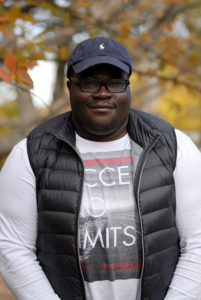
Zion Olojede
“Every black student in class feels like Rosa Parks on the bus,” Sy Stokes, a UCLA student, once said.
Is that a bit exaggerated? Maybe, but as a black student, it makes sense to me.
I’m not going to bore you with obvious statistics like the small percentage of black students at Lehigh — it’s four percent by the way — and compare it to other predominantly white universities across the country.
Instead, I’m going to put you in my shoes for a moment.
If you know me, you know I’m naturally a happy guy. Occasionally, I’ll have sour moods, as a normal person should, but I’m all smiles most of the time. You wouldn’t be able tell the difference between a great day or a dreadful day based of my facial expression. You can’t see the daily pressure that originates from the color of my skin.
It was about 9 p.m. on a Thursday night in late November. My friend, who is also black, and I were walking on a deserted Packer Avenue, and we saw a girl heading toward us. She glanced at us and quickly turned to our left to cross the street. It definitely caught my attention, but I didn’t think too much of it.
That was, until my friend turned around and said, “Wow look, she’s coming back to this side.”
I turned around and saw she had waited until she was was three or four steps behind us to return to the sidewalk we were walking on. I laughed, because it was the only thing I could do at the moment. But it lingered in my mind the rest of that week.
It wasn’t a coincidence.
Actions speak louder than words. We were two educated individuals with no criminal history minding our own business, but it’s the color of our skin that superseded our character.
Society has never changed with its stereotypical assumptions, it’s just people are less outspoken about it, or they speak about it behind a fake identity.
As a black student at a predominantly white institution, you have a target on your back whether you believe it or not. There’s a reaction for every public decision you make and everywhere you turn, you’re doubted or misinterpreted. Just one mistake, and you’re negatively affecting the general perception of the rest of the black students on campus. That’s just how it is.
Our society feeds off of stereotyping. I’m sure the majority of black students on campus have received the “you only got into Lehigh because of affirmative action” remark or something along the lines of that at some point. And those statements are still a close second to ignorant questions like, “What sport do you play?”
For some people, it might be natural to react that way because of how they were raised or what environment they grew up in. I understand that, but it’s still not an excuse.
I have to constantly prove myself to people. I have to prove that I worked my tail off to get where I am today. It doesn’t matter what your resume looked like in high school, the slate is wiped clean and you have to try to defy those perceptions when you get to college. I have so much respect for the senior class president, Freddy Coleman, who was the first black student at Lehigh ever to be a class president.
Just to be clear, I’m not pitting blacks against whites on campus or saying everyone has the same mindset of that girl who crossed the street. I’m merely sharing insight of my experience.
But let’s be real: We’re not even four years removed from the UMOJA house incident. Lehigh hasn’t changed. No matter how many smiling black students Lehigh puts on its brochure, it won’t make a difference. The perceptions and interactions will remain the same.
We’re not doing anything as a student body to improve on these perceptions. Take the Multicultural room, or “M-room,” in the University Center. It was designated to connect and unify people of different cultures and backgrounds, but from what I’ve seen it has essentially become a room for minorities only.
As corny as it sounds, as a student body we need to enlighten our stereotype-based mindsets by being more inclusive. There’s a social divide that causes people to separate into their own cliques and groups.
For instance, why are cultural Greek organizations excluded from conversations about Greek life and campus issues? Treating them the same as others would be a good first step in the right direction — a step to defy the stereotypes that are so ingrained at Lehigh.
Stereotypes are just skin deep. I’m proud of my skin color, but it doesn’t define me.
—
Zion Olojede, ’18, is the sports editor for The Brown and White. He can be reached at [email protected].





Comment policy
Comments posted to The Brown and White website are reviewed by a moderator before being approved. Incendiary speech or harassing language, including comments targeted at individuals, may be deemed unacceptable and not published. Spam and other soliciting will also be declined.
The Brown and White also reserves the right to not publish entirely anonymous comments.
8 Comments
Zion, in your article you are criticizing non-black Lehigh students for stereotyping black students. You write that a “majority of black students on campus” experience some type of racism coming from non-black students. You define this type of racism thru anecdotal evidence such as a student crossing the street intimating that she felt threatened by the mere presence of black students or non-black students asking black students if they play a sport. Could this possibly be a bit melodramatic, so many people (including myself as a white male) ignore perceived slights daily without making a big deal over them or reading too deeply into them.
Additionally, while you are critiquing the act of stereotyping, aren’t you, in fact, stereotyping the non-black Lehigh student body as generally racist or raised poorly? (“For some people, it might be natural to react that way because of how they were raised or what environment they grew up in.” )
I look forward to your response
Regards,
M. Gallagher
M. Gallagher, Zion never said people are poorly raised. He emphasizes the fact that the context of one’s upbringing can shape one’s perceptions and reactions towards people who are different from themselves. He also clearly says, “Just to be clear, I’m not pitting blacks against whites on campus or saying everyone has the same mindset of that girl who crossed the street. I’m merely sharing insight of my experience.”
This article might help you better understand and process why, even as a white male, you feel the need to defend and minimize, instead of listen and engage with these perspectives( bullet-points 1&2, especially): http://www.huffingtonpost.com/good-men-project/why-its-so-hard-to-talk-to-white-people-about-racism_b_7183710.html
Andrea, I find the method you are using to attempt to criticize my comment (which was intended to start a dialogue with the author) a bit funny and wholly ironic. Your grievance with me is, evidently, that I am unable to rationally discuss the topic of race because i am a white male. Wow. That is not only stereotyping me based on my gender and race, but using my unchangeable qualities to discriminate against and belittle my opinion. I encourage you to think thru the consequences of your words and really apply the same standards which you apply to others (in a very harsh manner) to yourself.
M. Gallagher, your responses are out of context. Zion said multiple times this is just to put yourself in his shoes. And he does make it very clear he’s not trying to start arguments. I think we can all try better to empathize, which means giving someone the benefit of the doubt before casting your own judgement on what they’re trying to say. As a white person, I’m making that attempt to rationalize racism and these micro-aggressions everyday. It’s about examining yourself even if you don’t think you’ll find anything.
Thank you, Zion, for speaking out on this important topic and sharing your perspectives. I can only hope more of this community can learn to listen and engage.
After reading the above comments I would like to first say, as a white student here sometimes I live in fear that I will be perceived as being racist because I am white, when in reality I’m not personally racist. Does that make sense?
Anyway I’ve never written a response before, but I typed up my initial reaction as soon as I read the article.. so Zion this is what I have to say to you!
Hi Zion! I don’t know if you remember me or not, but I am like 96% sure we were in the same orientation group freshman year! I am also good friends with Becca Willkin and I’m pretty sure you’re friends through the B&W?
Anyway, I just read your article and I really really felt you had some great points! I apologize on the behalf of some white people? (Idk how to word this) For ever judging you on the basis of race.
I really related to what you said when you constantly feel that you have to prove to people that you are smart and that you deserve to be here. Literally one of my first days of being here at Lehigh I was sitting with some people at convocation. I didn’t know these girls very well, but I sat with them anyway. A legacy led the line with some flag and the girls around me found out she was a legacy. They began making comments along the lines of, “she only got to carry the flag because she’s a legacy” “she only got into Lehigh because her mom went here”- little did they know I am sitting there listening and I myself am a legacy. That made me question my own worth and my own abilities. I asked myself… did I only get into Lehigh because my grandfather, father, two uncles, and an aunt went here? And then I realized, no. I’ve worked so hard to be a good student and to be where I am today.
Alright, I’ve gotten a little off topic, but there’s one last thing I’d like to say: I know I am only one person, and I can’t speak for all people, but I do truly hope Lehigh continues to recognize the racism and discrimination that people are experiencing here and that negative attitudes like these are unacceptable in society.
Hope you have a nice day 🙂
⁃ Alex Madison
https://youtu.be/ofpZoqD1_X0 We need to get to know each other. Unfortunately it not as simple as what is shown on youtube.
Here we go again. Yet one more example of the perpetually aggrieved claiming victimhood.
Professor and scholar John McWhorter who describes himself as “a cranky liberal Democrat” wrote about this victimhood problem in his book: Losing the Race: Self Sabotage in Black America.
I note this book is available in Fairchild library.
With regards to the number of Blacks at Lehigh, Zion says this near the beginning of his article:
” I’m not going to bore you with obvious statistics like the small percentage of black students at Lehigh — it’s four percent by the way — and compare it to other predominantly white universities across the country.”
In reality, it is even lower and is 3.66% according to Lehigh’s latest Common Data Set statistics.
Professor McWhorter also wrote an interesting essay that can be found here:
https://www.city-journal.org/html/who-should-get-college-12415.html
Within this essay McWhorter says:
“. . . elite universities have come to mean something much different when they speak of “diversity”: having as many brown faces on campus as possible, regardless of standards.”
As McWhorter points out later in the essay, SAT scores (in spite of the naysayers) do a pretty good job of predicting how well a student will perform in college.
There is a considerable body of knowledge that demonstrates that students whose SAT scores are below the prevailing mainstream will do poorly. For example, see this column by Thomas Sowell:
https://www.creators.com/read/thomas-sowell/12/15/attacking-the-truth
Even where the SAT scores for Blacks are on par with their white peers, they often underperform. The issue is discussed in this essay by Russell Nieli.
http://www.mindingthecampus.org/2010/09/the_underperformance_problem/
SO WHAT HAS BEEN HAPPENING AT LEHIGH?
How well are blacks doing at Lehigh with regards to academics and whether they wind up graduating?
I note that Zion made the Dean’s List for the Spring 2016 semester. So it would appear he is doing fine.
But what about the successes and failures of blacks at Lehigh over the years?
There is a website called College Results Online that has extensive data about almost every four year college and university in the United States.
The website is made available by a nonprofit organization The Education Trust.
The mission of this organization is to be:
“Fierce advocates for the high academic achievement of all students—particularly those of color or living in poverty.”
A basic measure of student success is whether a student graduates. A common measure that is used is the six-year graduation rate. The College Results Online website provides a wealth of data for this metric broken down by race and gender.
The website can be found at: http://www.collegeresults.org
The most recent data set available on the website is for 2014. Thus the six-year data are for students in the 2008-2014 time span.
The data for Lehigh show that Whites had a graduation rate of 90%. Whereas Blacks had a rate of 72.7%
Thus the gap is HUGE. Namely, -17.3%
I have used the College Results website to compare Lehigh with the sorts of selective predominately white schools to which Zion alludes.
Lehigh ranks as one of the worst – BOTH from the standpoint of the percentage of Blacks in the student body as well as having one of the worst six-year graduation rates.
I suspect what is going on is that the admissions office has been doing a lousy job of finding and convincing higher quality students (those with great SAT scores) to enroll at Lehigh.
Another fundamental problem within Black culture and discussed in McWhorter’s Losing the Race book is an anti intellectual attitude. He has two chapters devoted to:
The Cult of Anti-Intellectualism.
He also has a chapter titled the Cult of Separatism.
Let’s face it Umoja House is blatantly a segregated dormitory.
I note that a year ago, the University of Connecticut was admonished by two commissioners on the United States Commission on Civil Rights for setting up such an arrangement. See:
http://www.newamericancivilrightsproject.org/wp-content/uploads/2016/03/3.21LettertoUConnonRacialThemeHousing.pdf
Lehigh should abolish the Umoja House as well as the Multicultural room. Clearly they foster separatism rather than unity and are counterproductive.